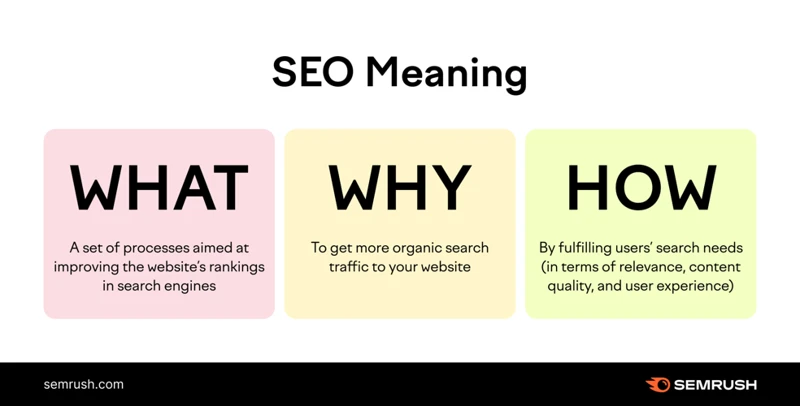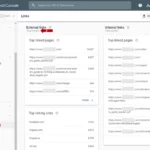Yes, you can use multiple SEO tools simultaneously. In fact, using a combination of tools can provide a more comprehensive analysis of your website’s performance and help you uncover different insights and opportunities.
Why Do You Need an SEO Tool?

When it comes to online marketing, having an SEO tool is essential for several reasons. Firstly, an SEO tool provides valuable insights into your website’s performance, allowing you to track key metrics such as organic traffic, keyword rankings, and backlinks. This data helps you understand how well your website is performing in search engine results and identify areas for improvement. Additionally, an SEO tool enables you to conduct thorough keyword research, which is crucial for optimizing your website’s content and driving targeted organic traffic. By analyzing search volume, competition, and other relevant factors, you can discover high-value keywords that will help your website rank higher in search engine results. An SEO tool allows you to monitor your competitors’ strategies and stay ahead of the game. With features like competitor analysis and backlink research, you can identify opportunities to outrank your competitors and attract more visitors to your website. An SEO tool is a valuable asset for any online marketer, providing the necessary insights and data to enhance your website’s performance and drive organic traffic. So, if you want to improve your online presence and outrank your competitors, investing in an SEO tool is a wise decision.
1. Evaluate Your SEO Goals
Evaluating your SEO goals is the first step in choosing the right SEO tool for your online marketing needs. Before you start researching different tools, it’s important to have a clear understanding of what you want to achieve with your SEO efforts. Are you looking to increase organic traffic, improve keyword rankings, or track your website’s performance? Make a list of your specific goals and prioritize them based on importance. By doing so, you can narrow down your options and focus on finding a tool that aligns with your objectives. For example, if your main goal is to improve keyword rankings, you might want to look for an SEO tool that offers comprehensive keyword research and tracking features. On the other hand, if your priority is to track your website’s performance and monitor backlinks, a tool with robust analytics and backlink monitoring capabilities would be more suitable. Evaluating your SEO goals will help you determine the specific features and functionality you need in an SEO tool, making it easier to find the right fit for your online marketing needs. Learn more about how to write SEO content that ranks.
2. Research Different SEO Tool Types
When researching different SEO tool types, it’s important to understand the various options available in the market. One common type of SEO tool is the keyword research tool. This tool helps you identify relevant keywords that are popular among your target audience and have a high search volume. By incorporating these keywords into your website’s content, you can improve your chances of ranking higher in search engine results and driving organic traffic. Another type of SEO tool is the backlink analysis tool. Backlinks are crucial for improving your website’s authority and visibility in search engine results. This tool helps you analyze the quality and quantity of backlinks pointing to your website, as well as those of your competitors. By understanding your backlink profile, you can identify opportunities for improvement and develop strategies to attract high-quality backlinks. Other types of SEO tools include website audit tools, rank tracking tools, and competitor analysis tools. Each type serves a specific purpose in optimizing your website’s performance and enhancing your online marketing efforts. It’s important to research and evaluate different SEO tool types to determine which ones align with your specific needs and goals. By understanding the features and functionalities of each type, you can make an informed decision and choose the right SEO tool for your online marketing needs.
3. Consider Your Budget
When choosing an SEO tool, it’s important to consider your budget. Different SEO tools come with varying price points, so it’s crucial to determine how much you are willing to invest in an SEO tool. Keep in mind that while some tools may have higher upfront costs, they may offer more advanced features and capabilities. On the other hand, there are also budget-friendly options available that can still provide valuable insights and data. It’s essential to strike a balance between your budget and the features you require from an SEO tool. Consider the long-term benefits and potential return on investment that the tool can provide. Additionally, some SEO tools offer different pricing plans or subscription options, allowing you to choose the one that best fits your budget and business needs. Take the time to research and compare different pricing options to make an informed decision. Remember, investing in the right SEO tool is crucial for your online marketing success, but it should also align with your budgetary constraints. So, carefully evaluate your budget and choose an SEO tool that offers the features you need at a price you can afford.
4. Assess the Tool’s Features
When choosing an SEO tool, it’s crucial to thoroughly assess its features to ensure that it meets your specific needs. Here are some key features to consider:
1. Keyword Research: Look for a tool that provides comprehensive keyword research capabilities. It should allow you to discover relevant keywords with high search volume and low competition.
2. Rank Tracking: The tool should offer rank tracking functionality, enabling you to monitor your website’s keyword rankings over time. This will help you gauge the effectiveness of your SEO efforts.
3. Backlink Analysis: Backlinks play a vital role in SEO, so it’s important to choose a tool that offers detailed backlink analysis. This feature will allow you to analyze the quality and quantity of your backlinks, as well as those of your competitors.
4. Site Audit: A site audit feature helps identify technical issues on your website that may be impacting its performance in search engine rankings. This includes checking for broken links, duplicate content, and other factors that can negatively affect SEO.
5. Competitor Analysis: The tool should provide insights into your competitors’ strategies, allowing you to identify their top-performing keywords, backlinks, and content. This information will help you create a more effective SEO strategy.
6. Reporting and Analytics: Look for a tool that offers comprehensive reporting and analytics features. It should provide detailed data on your website’s performance, including organic traffic, conversions, and other key metrics.
7. Social Media Integration: Social media plays a significant role in online marketing, so choose a tool that integrates with popular social media platforms. This will enable you to track and analyze the impact of your social media efforts on your SEO performance.
By carefully assessing the features of an SEO tool, you can ensure that it aligns with your specific requirements and helps you achieve your online marketing goals. Remember to prioritize the features that are most important to your business and choose a tool that offers a user-friendly interface and accurate data reporting.
5. Check for User-Friendly Interface
When choosing an SEO tool for your online marketing needs, it is important to consider the user-friendliness of the interface. A user-friendly interface makes it easier for you to navigate through the tool’s features and access the data you need. Look for an SEO tool that has a clean and intuitive interface, with clearly labeled sections and easy-to-understand menus. The tool should also provide helpful tooltips or tutorials to guide you through its functionalities. A user-friendly interface saves you time and frustration, allowing you to quickly analyze data and make informed decisions for your SEO strategy. Additionally, a tool with a user-friendly interface is beneficial if you plan to collaborate with a team or outsource your SEO tasks. It ensures that everyone can easily navigate and utilize the tool’s features without extensive training. So, when evaluating SEO tools, pay attention to the user-friendliness of the interface to ensure a seamless experience in managing your online marketing efforts.
Link: how to start an SEO agency
6. Look for Accurate Data Reporting
When choosing an SEO tool, it is crucial to look for accurate data reporting capabilities. Accurate data is essential for making informed decisions and optimizing your online marketing strategies. Look for an SEO tool that provides real-time data, ensuring that you have the most up-to-date information about your website’s performance. The tool should offer comprehensive reporting on key metrics such as organic traffic, keyword rankings, and backlinks. It should also provide detailed insights into your competitors’ strategies, allowing you to identify opportunities for improvement. Additionally, the SEO tool should have robust data validation processes in place to eliminate any inaccuracies or discrepancies in the reporting. This ensures that the data you rely on is reliable and trustworthy. Accurate data reporting is crucial for measuring the success of your SEO efforts and making data-driven decisions. So, when evaluating SEO tools, prioritize those that offer accurate and reliable data reporting capabilities. By doing so, you can confidently analyze your website’s performance and make the necessary optimizations to drive organic traffic and improve your search engine rankings.
7. Check for Integration with Other Tools
When choosing an SEO tool, it’s important to consider its integration capabilities with other tools in your marketing toolkit. Integration with other tools can streamline your workflow and provide a more holistic view of your online marketing efforts. Look for an SEO tool that seamlessly integrates with popular platforms such as Google Analytics, Google Search Console, and social media management tools. Integration with Google Analytics allows you to access valuable data about your website’s performance and track the impact of your SEO efforts on traffic and conversions. Integration with Google Search Console provides insights into your website’s visibility in search results, including information about indexed pages, crawl errors, and backlinks. This integration can help you identify any issues affecting your website’s SEO performance and take corrective actions. Additionally, integration with social media management tools enables you to analyze the impact of your social media activities on your SEO efforts. Tracking social signals and engagement metrics can provide valuable insights into the effectiveness of your content and help you optimize your social media strategy for better SEO results. By choosing an SEO tool that integrates seamlessly with other tools in your marketing stack, you can save time and effort by accessing all the necessary data and insights in one place. This integration ensures a more comprehensive and efficient approach to your online marketing efforts. So, when evaluating SEO tools, don’t forget to check for integration capabilities, as it can greatly enhance your overall marketing strategy.
8. Read Customer Reviews and Ratings
When choosing an SEO tool, it’s important to consider the experiences and opinions of other users. Reading customer reviews and ratings can provide valuable insights into the effectiveness and reliability of a particular tool. Look for reviews that highlight the tool’s strengths and weaknesses, as well as its ease of use and customer support. Pay attention to reviews from businesses or individuals in similar industries or with similar goals as yours, as their feedback may be more relevant to your specific needs. Additionally, check for any common issues or complaints mentioned in the reviews, as this can indicate potential drawbacks or limitations of the tool. Keep in mind that not all reviews may be genuine, so it’s important to consider a variety of sources and evaluate the overall consensus. By reading customer reviews and ratings, you can gain a better understanding of the pros and cons of different SEO tools and make an informed decision.
9. Consider Customer Support and Training
When choosing an SEO tool for your online marketing needs, it’s important to consider the level of customer support and training provided. Having access to reliable customer support can make a significant difference in your experience with the tool. Look for a tool that offers multiple channels of support, such as email, live chat, or phone support, so you can easily reach out for assistance when needed. Additionally, consider whether the tool provides training resources such as documentation, tutorials, or webinars to help you learn how to effectively use the tool and maximize its potential. A tool that offers comprehensive customer support and training ensures that you can quickly resolve any issues and make the most out of the tool’s features. This can save you time and frustration in the long run, allowing you to focus on optimizing your website and achieving your online marketing goals. So, when evaluating SEO tools, don’t overlook the importance of customer support and training in ensuring a smooth and productive experience.
Popular SEO Tools to Consider
When it comes to choosing the right SEO tool, there are several popular options to consider. These tools offer a range of features and functionality to meet your specific needs. Here are a few popular SEO tools that you should consider:
1. SEMrush: SEMrush is a comprehensive SEO tool that offers features such as keyword research, competitor analysis, backlink analysis, and site auditing. With its user-friendly interface and accurate data reporting, SEMrush is a favorite among digital marketers for optimizing their websites and improving search engine rankings.
2. Moz: Moz is another widely used SEO tool that provides a range of features, including keyword research, on-page optimization, site auditing, link building, and rank tracking. Moz also offers a unique feature called “Moz Pro Q&A,” where users can get answers to their SEO-related questions from industry experts.
3. Ahrefs: Ahrefs is known for its extensive backlink analysis capabilities. It allows users to analyze their own backlinks as well as those of their competitors, providing valuable insights for link building strategies. Ahrefs also offers features such as keyword research, content analysis, and rank tracking.
4. Google Analytics: While not solely an SEO tool, Google Analytics is a powerful tool for tracking website performance and analyzing user behavior. It provides valuable insights into organic traffic, conversion rates, bounce rates, and more, helping you make data-driven decisions to improve your SEO efforts.
5. Screaming Frog: Screaming Frog is a website crawler tool that provides detailed insights into your website’s structure, URLs, meta data, and more. It helps identify any technical issues that may be affecting your website’s SEO performance, such as broken links or duplicate content.
Each of these SEO tools has its own unique features and benefits. Depending on your specific needs and budget, you can choose the tool that best fits your requirements. Remember to consider factors such as ease of use, accurate data reporting, and integration with other tools when making your decision. Ultimately, the right SEO tool will help you optimize your website and drive organic traffic to achieve your online marketing goals.
1. SEMrush
SEMrush is a popular and comprehensive SEO tool that offers a wide range of features to help optimize your online marketing efforts. With SEMrush, you can conduct keyword research, track your website’s rankings, analyze your competitors’ strategies, and perform site audits. This tool provides detailed insights into your website’s performance, allowing you to identify areas for improvement and optimize your content accordingly. SEMrush also offers a backlink analysis feature, which helps you understand the quality and quantity of backlinks pointing to your website. By analyzing your backlink profile, you can identify any issues and take steps to improve your link building strategy. Additionally, SEMrush provides a competitive analysis feature, allowing you to compare your website’s performance with that of your competitors. This helps you identify opportunities to outrank your competitors and attract more organic traffic to your website. SEMrush is a powerful SEO tool that offers a wide range of features to enhance your online marketing efforts and drive organic traffic to your website. Whether you are a beginner or an experienced marketer, SEMrush is a tool worth considering to boost your website’s performance and achieve your SEO goals.
2. Moz
Moz is a popular SEO tool that offers a wide range of features to improve your online marketing efforts. With its comprehensive keyword research tool, you can discover valuable keywords and track their rankings over time. Moz also provides insights into your website’s domain authority, which is a measure of how well your website is likely to rank in search engine results. This information can help you identify areas for improvement and develop a strategy to increase your website’s visibility. Additionally, Moz offers a backlink analysis tool that allows you to monitor your backlink profile and identify potential issues or opportunities for improvement. By analyzing your backlinks, you can ensure they are of high quality and relevant to your website’s content. Moz also provides competitive analysis features, allowing you to compare your website’s performance to that of your competitors. This can help you identify gaps in your marketing strategy and make informed decisions to stay ahead in the competitive online landscape. Moz is a comprehensive SEO tool that provides valuable insights and data to improve your website’s performance and drive organic traffic. So, if you’re looking for a tool to enhance your online marketing efforts, Moz is definitely worth considering.
3. Ahrefs
Ahrefs is a popular SEO tool that offers a comprehensive suite of features to help you improve your website’s visibility and rankings. With its robust backlink analysis capabilities, Ahrefs allows you to explore and monitor your website’s backlink profile, helping you understand the quality and quantity of backlinks pointing to your site. This information is crucial for improving your website’s authority and reputation in the eyes of search engines. Ahrefs also provides valuable insights into your competitors’ backlink profiles, allowing you to identify potential link-building opportunities and gain a competitive advantage. Additionally, Ahrefs offers powerful keyword research tools that enable you to discover high-value keywords with ease. You can explore keyword difficulty, search volume, and click-through rates to identify keywords that have the potential to drive targeted traffic to your website. With Ahrefs, you can also track your keyword rankings over time and monitor your website’s performance in search engine results. Ahrefs provides comprehensive site audit features, allowing you to identify and fix any technical SEO issues that may be affecting your website’s performance. Ahrefs is a robust SEO tool that offers a wide range of features to help you optimize your website and drive organic traffic. Whether you’re a beginner or an experienced SEO professional, Ahrefs is a valuable tool to have in your arsenal. If you’re looking to improve your backlink profile and boost your website’s rankings, Ahrefs is definitely worth considering.
4. Google Analytics
Google Analytics is a powerful SEO tool that provides comprehensive data and insights about website performance. It offers a wide range of features that help you track and analyze various metrics. With Google Analytics, you can monitor website traffic, including the number of visitors, pageviews, and bounce rate. This data allows you to understand how users are interacting with your website and identify areas for improvement. Additionally, Google Analytics provides valuable information about the source of your website traffic, whether it’s from organic search, social media, or referral links. This helps you understand which channels are driving the most traffic to your site and focus your efforts accordingly. The tool also offers in-depth keyword analysis, allowing you to see which keywords are driving the most organic traffic to your website. This information can help you optimize your content and target high-value keywords. Google Analytics also offers valuable insights into user behavior, such as the average time spent on each page and the conversion rate. This data can help you identify opportunities to improve user experience and increase conversions. Google Analytics is a must-have SEO tool for any online marketer, providing valuable data and insights to optimize website performance and drive organic traffic.
5. Screaming Frog
Screaming Frog is a powerful SEO tool that offers a wide range of features to help you optimize your website. One of its key functionalities is the ability to crawl your website and provide detailed insights into its structure and performance. The tool allows you to analyze various aspects of your website, such as broken links, duplicate content, and page titles. By identifying and fixing these issues, you can improve your website’s user experience and ensure that search engines can properly index your pages. Screaming Frog also provides valuable information about your website’s meta data, including meta descriptions and header tags. This allows you to optimize these elements for better search engine visibility and click-through rates. Another useful feature of Screaming Frog is its ability to generate XML sitemaps, which help search engines understand the structure of your website and index your pages more efficiently. With its comprehensive set of features, Screaming Frog is a valuable tool for conducting website audits and optimizing your website for better search engine rankings. Whether you’re a beginner or an experienced SEO professional, this tool can provide valuable insights and help you improve your website’s performance. So, if you’re looking for a reliable and feature-rich SEO tool, consider giving Screaming Frog a try.
Conclusion
In conclusion, choosing the right SEO tool for your online marketing needs is crucial for achieving success in today’s competitive digital landscape. By evaluating your SEO goals, researching different tool types, considering your budget, assessing the tool’s features, and checking for user-friendly interfaces and accurate data reporting, you can make an informed decision. Integration with other tools, customer reviews and ratings, as well as customer support and training, should also be taken into account. Popular SEO tools like SEMrush, Moz, Ahrefs, Google Analytics, and Screaming Frog are worth considering due to their comprehensive features and capabilities. By utilizing the insights and data provided by these tools, you can optimize your website, enhance your online marketing strategies, and drive organic traffic. So, take the time to choose the right SEO tool that aligns with your specific needs and goals, and watch your online presence grow. Don’t let your backlinks go unnoticed, read our article on why your backlinks may not be showing up to understand how to address this common issue.
Frequently Asked Questions
1. Can I use multiple SEO tools simultaneously?
Yes, you can use multiple SEO tools simultaneously. In fact, using a combination of tools can provide a more comprehensive analysis of your website’s performance and help you uncover different insights and opportunities.
2. Are SEO tools only useful for large businesses?
No, SEO tools are beneficial for businesses of all sizes. Whether you’re a small business or a large enterprise, an SEO tool can help you optimize your website, improve your rankings, and attract more organic traffic.
3. How do SEO tools help with keyword research?
SEO tools assist with keyword research by providing data on search volume, competition, and related keywords. This information helps you identify high-value keywords to target in your content and optimize your website for better search engine rankings.
4. Can SEO tools improve my website’s speed?
While SEO tools cannot directly improve your website’s speed, they can provide insights and recommendations to optimize your website’s performance. These recommendations may include minimizing file sizes, optimizing images, and reducing server response time.
5. Do SEO tools guarantee higher search rankings?
No, SEO tools do not guarantee higher search rankings. However, they provide valuable data and insights that can help you make informed decisions and optimize your website for better search engine visibility, which can ultimately lead to higher rankings.
6. Can I track my competitors’ SEO strategies with an SEO tool?
Yes, many SEO tools offer competitor analysis features that allow you to track and monitor your competitors’ SEO strategies. This information can help you identify opportunities, learn from their successes, and stay ahead in the competitive online market.
7. Are SEO tools difficult to use?
The ease of use varies across different SEO tools. However, many tools offer user-friendly interfaces and provide tutorials or customer support to help you navigate and utilize their features effectively.
8. Can I integrate SEO tools with other marketing tools?
Yes, most SEO tools offer integration options with other marketing tools such as Google Analytics, content management systems, and social media platforms. This integration allows for seamless data sharing and a more holistic approach to your online marketing efforts.
9. How often should I use an SEO tool?
The frequency of using an SEO tool depends on your specific needs and goals. It is recommended to use an SEO tool regularly to monitor your website’s performance, track changes, and make necessary adjustments to your SEO strategies.
10. Do SEO tools only focus on organic search?
No, while organic search is a primary focus for SEO tools, many also provide insights and data on other aspects of online marketing, such as paid search, social media, and backlink analysis. This comprehensive approach helps you optimize all aspects of your online presence.







